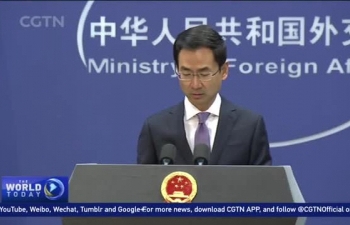NEW YORK, May 13 (Xinhua) -- A three-day conference on China and U.S. health policy and healthcare wrapped up at Yale University on Sunday.
The conference, Advances in Health Policy and Healthcare: The Road Ahead, held at the Yale School of Public Health (YSPH) on May 11-13, brought together 240 prominent public health, economics and data science researchers, healthcare professionals, entrepreneurs, NGOs, government officials from the U.S., China, and other regions in the world for organized sessions, roundtables and workshops centered around scholarly exchange and professional development.
"We spent tremendous efforts to put together most important public health issues in both countries into 35 cohesive discussion sessions. Each session includes closely related studies in the U.S. and China's healthcare systems to facilitate us to solve these critical issues in comparative perspectives," said Xi Chen, assistant professor of health policy and economics at YSPH and president of China Health Policy and Management Society (CHPAMS) in an interview with Xinhua.
"In many cases we already have good answers to some public health issues, our goal is to make it happen and to improve people's well-being," he said.
This is the second Biennial Conference of CHPAMS, a non-profit academic organization focused on the advancement and dissemination of health policy and healthcare management in China.
During the discussions, speakers have touched upon three trends of major transitions in the health sector: first, health service provision should target patients as well as healthy citizens; second, population health is better managed from "cradle to grave" ; third, health should be relevant all related sectors in addition to health. For example, industries such as food, environment, sport, and public transit also play important roles.
Dr. Sten H. Vermund, dean of Yale School of Public Health, offered his perspectives on tackling China's public health challenges drawing the U.S. and EU experiences.
Lincoln Chen, President of China Medical Board, discussed China's role in the transformation of global health, especially through the Belt and Road Initiative and direct health aid.
Paul D. Cleary, former Dean of Public Health at Yale University talked about using information from patients to guide and assess healthcare transformation.
Michael Grossman, Director of Health Economics Program at the U.S. National Bureau of Economic Research (NBER) summarized health economics research at NBER and its implication for health economics research in China.
Harlan M Krumholz, Director of Center for Outcomes Research and Evaluation at Yale-New Haven Hospital presented the way China could lead the world to the next generation of health care through designing a smart, digital, and learning health care system.
T. Paul Schultz, former director of Yale's Economic Growth Center, argued that national health insurance can promote more equitable access to health care, but more has to be done in many countries to enhance enrolment.
Jody L. Sindelar, founding President of American Health Economics Association, shared her insights on the new approaches to smoking cessation through behavioral economics, financial incentives, windows of opportunities and wearables. Sindelar also discussed her ongoing work in China to reduce secondhand smoke for many women.
The event was co-hosted by Yale School of Public Health, Yale Macmillan Center, Yale Institute for Global Health, and Yale-China Association.













